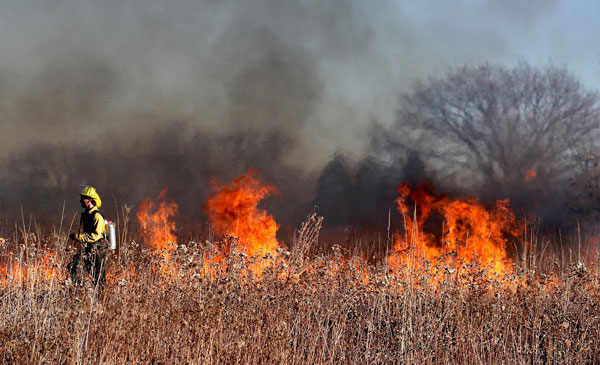Wildfire in world’s largest wetland results in many rare animals dying

[Firefighter walking out of a wildfire. Photo Credit to Pixabay]
Pantanal, the world’s largest wetlands spreading over Brazil, Bolivia, and Paraguay, has been hit by a deadly wildfire — threatening all the species in the vast ecosystem.
The wetlands cover three countries in South America, 80% of which is in Brazil, with the rest spreading over into Bolivia and Paraguay, according to The New York Times.
The Pantanal covers a total of 68,000 square miles, an area 20 times the size of the Everglades, a large wetlands preserve in Florida.
The vast ecosystem of the Pantanal, which is usually flooded, has recently been parched by droughts and fires, a critical condition spreading throughout the land.
Scientists link the cause to climate change and deforestation, which have eventually led to the outbreak of fires throughout the wetlands.
This severe disaster has created a huge impact on biodiversity as well as the well-being of the ecosystem.
The wetlands are home to some of the most unique and rare species in the world, some having developed from species that cannot be found in other areas.
The loss of these valuable populations raises questions about whether this will result in long-term damage to the ecosystem, which is home to nearly 5,000 different species of animals.
Not only are the wetlands a habitat for wildlife, but also home to entire populations that depend on this area for habitat to develop and grow.
Hundreds of forests being wiped out have created severe damage to these species.
The fires have not only affected the animals, but also their food chain.
Plants, trees, and other small insects have faced crucial damage, decreasing chances of survival for other animals that rely on the bottom of the food chain for prey or habitat.
As of now, three jaguars have been discovered dead, and another four have been sent for treatment of burns and other injuries.
Even jaguars, being among the fastest and most dangerous animals of the ecosystem, have lost in the face of blazing fires.
This puts the welfare of other animals that may be slower than jaguars in critical conditions.
As the fires continue to rage, researchers and scientists are rushing to conserve as many species and areas of refuge as possible.
Already, thousands of species have been affected, with hundreds of them endangered or threatened.
For example, the flames have already destroyed 80% of a crucial nesting area for hyacinth macaws, large, bright blue parrots that are vulnerable and in decline.
Regarding the future of the Pantanal, experts worry that the fire will not stop until October, when rainfall is expected to arrive.
The damage that the wildfire has dealt to the ecosystem may not be able to fully recover, and neither will the species.
The fires in the Pantanal are not just a local tragedy; they are a global loss.
The world is watching as one of its most vital ecosystems is reduced to ash, and with it, the lives of countless animals and the stories of species that have evolved over millennia.

- Yubin Kim / Grade 11 Session 5

![THE HERALD STUDENT REPORTERS [US]](/assets/images/logo_student_us.png)
![THE HERALD STUDENT REPORTERS [Canada]](/assets/images/logo_student_ca.png)
